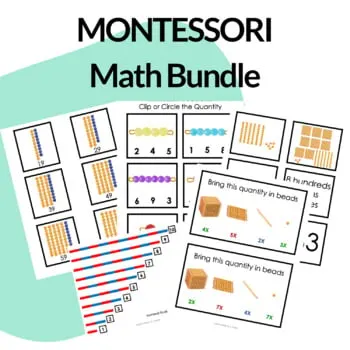I earn commissions from my affiliated links. Please see my disclosure policy for more details.
Curious about the Montessori Math Activities?
Math in Montessori is a unique and beautiful approach to teaching children. I thought a helpful place to start would be to share the sequence of Montessori Math materials, activities & lessons that I learned in my training program.
The Montessori method is an educational approach that focuses on hands-on learning. It was developed by Maria Montessori, a physician, and educator, in the early 1900s. She believed children learn best when engaged in active, creative, and purposeful play. The Montessori maths curriculum is the perfect example of this approach.
Montessori math materials and activities are designed to provide hands-on, concrete experiences that help children develop a deep understanding of mathematical concepts. Here are some of the best
Download Montessori Math Lessons Here
Keep in mind that this is a PATH, not linear. Some lessons (Numeration and Place Value) are given in order, while others (Linear Counting and Math Facts) can be shared and practiced by the child simultaneously.
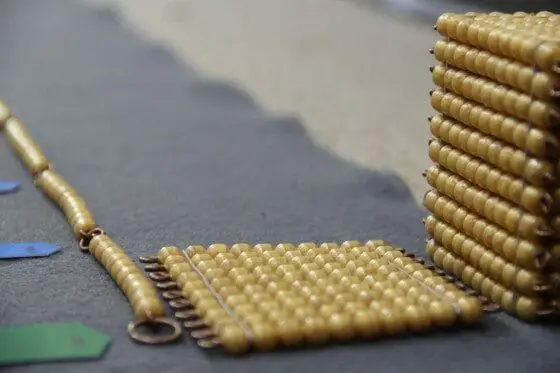
Learn the Montessori Math Activities & Lessons
Montessori math activities and lessons are designed to provide children with hands-on, concrete experiences that promote understanding, problem-solving, and independent thinking in mathematics.
Montessori Math Activities & Lessons Used in Classrooms
- Number Recognition: Activities that focus on number recognition help children develop a strong foundation in numeracy. This can include matching numerals to quantities, sequencing numbers, and identifying numbers in the environment.
- Counting and One-to-One Correspondence: Counting activities help children understand the concept of quantity and develop one-to-one correspondence. Children can count objects, use counters or beads to match numbers or practice skip counting.
- Number Operations: Montessori math materials and activities provide concrete experiences for addition, subtraction, multiplication, and division. Children work with manipulatives such as bead bars, number rods, or the stamp game to explore and practice mathematical operations.
- Place Value: Place value activities focus on understanding the value of digits in a number. Children use materials like golden beads or place value cards to learn about units, tens, hundreds, and thousands and explore regrouping and exchanging.
- Fractions: Montessori introduces fractions in a hands-on and visual way. Children work with fraction materials like fraction insets or fraction circles to understand the concept of parts of a whole and develop a solid foundation for further fraction work.
- Geometry: Geometry activities in Montessori focus on geometric shapes, their properties, and spatial awareness. Children work with materials like geometric solids, geometric insets, or pattern blocks to explore shapes, create patterns, and develop an understanding of geometry concepts.
- Measurement: Measurement activities help children develop an understanding of length, weight, volume, and time. Montessori materials like the long rods, the pink tower, or the sandpaper numerals support hands-on exploration and measurement concepts.
- Money and Time: Montessori math activities include teaching children about money and time. Children work with manipulatives like play money or clock materials to learn about the value of coins, tell time, and understand concepts of duration and sequencing.
- Problem-Solving and Critical Thinking: Montessori math activities encourage problem-solving and critical thinking skills. Children are provided with open-ended activities and challenges that require them to apply their mathematical knowledge and reasoning skills to find solutions.
In Montessori, math activities are often presented individually or in small groups, allowing children to work at their own pace and progress according to their abilities. The materials and activities are designed to be self-correcting, allowing children to independently recognize and correct their own mistakes.
Montessori Materials Mathematics
Before Numbers
Montessori’s Before Numbers is a precursor to formal number recognition and introduces young children to the concept of quantity and numerical order.
Before Numbers activities are designed to help children develop a sense of numerical sequence and prepare them for a more concrete understanding of numerals and quantity.
- Pre-Counting Activities
- Readiness for Numerals
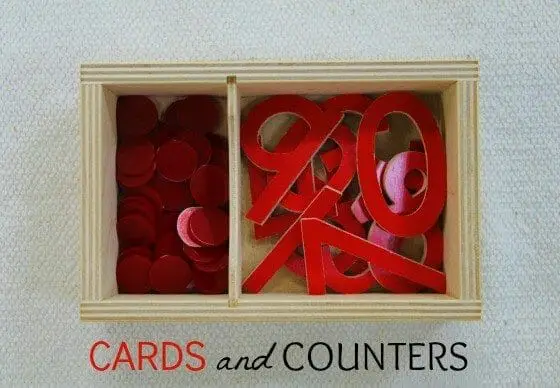
Introduction to Numeration
Montessori numeration is a key concept in the Montessori method of education that focuses on helping children develop a solid understanding of numbers and their relationships.
It encompasses the foundation of numeracy and lays the groundwork for more complex mathematical concepts.
Montessori numeration activities and materials are designed to promote the internalization of numerical concepts through hands-on, sensorial experiences.
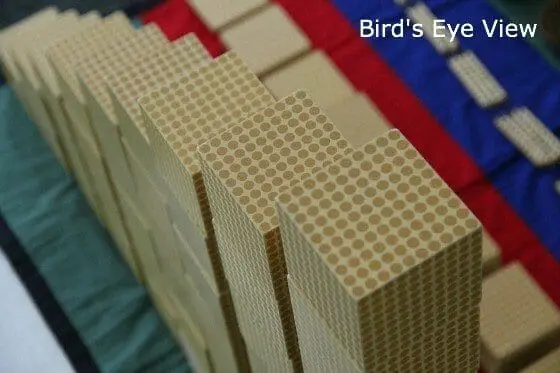
Place Value & Decimal System
Montessori Place Value and Decimal System is a fundamental concept in Montessori math education that introduces children to the concept of place value and the decimal system. It provides a concrete and visual way for children to understand the value and relationship of digits within numbers.
In Montessori, the Place Value and Decimal System is typically introduced through the use of specialized materials. The Golden Beads material is one of the key Montessori materials used for this purpose. It consists of golden beads that represent units, tens, hundreds, and thousands.
- Golden Beads Presentation Tray
- Equivalence Tray & Crisis of Nine Tray
- Overview of Golden Beads
- Composition of Quantities
- Introduction to Numerals
- Overview of Numerals
- Composition of Symbols
- Bird’s Eye View
- Composition of Numerals and Quantities
- Bank Game
- Golden Bead Operations
- Stamp Game
- Dot Game
- Small Bead Frame
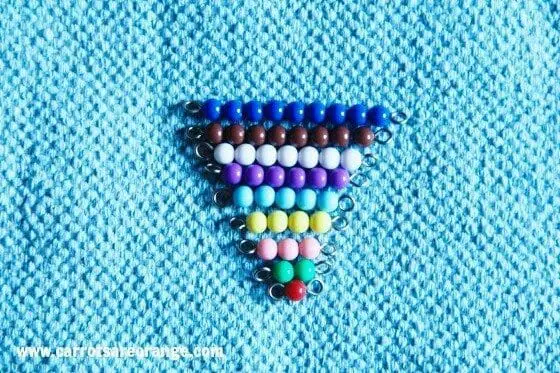
Montessori Math – Linear Counting
Montessori’s Linear Counting is an approach to teaching and learning numbers in a sequential and linear manner. It is an important aspect of early math education in Montessori classrooms and serves as the foundation for understanding number order and quantity.
The Montessori Linear Counting activities typically involve the use of various materials and strategies to help children develop a solid understanding of numbers and their sequence.
Montessori Math – Memorization
Montessori Memorization is an approach to learning that focuses on developing children’s memory skills through purposeful and meaningful activities.
In Montessori education, memorization is not solely about rote memorization but rather about engaging the child’s mind and making connections to enhance understanding and retention.
- Number Rod Addition
- Short Bead Stair Addition
- Addition Snake Game
- Addition Strip Board
- Subtraction Snake Game
- Subtraction Strip Board
- Short Bead Stair Multiplication
- Multiplication Board
- Division Board
- Fraction Boards
Montessori Math Materials
- Montessori Services has time & measurement resources, miscellaneous math materials, and offers some of my favorite math books.
- Amazon has a selection of quality, authentic Montessori Math materials, including a Multiplication Bead Board, an Addition Strip Board, the Stamp Game, a Hundred Board, Cards and Counters, and Spindle Boxes.
By providing concrete experiences, manipulation of materials, and opportunities for exploration, Montessori math activities and lessons foster a deep understanding of mathematical concepts, build problem-solving skills, and instill a love for mathematics in children.
Related Reads
Marnie



